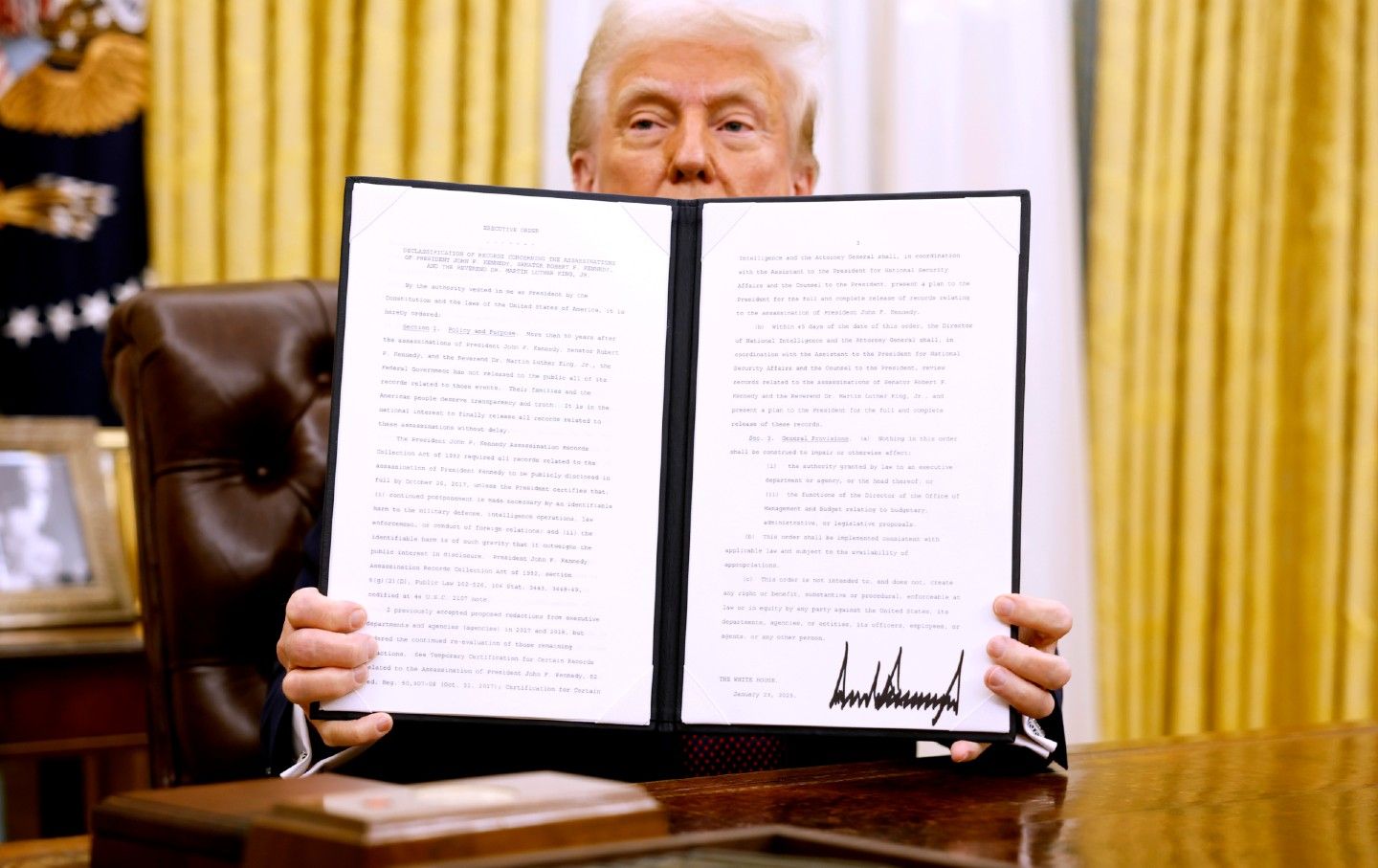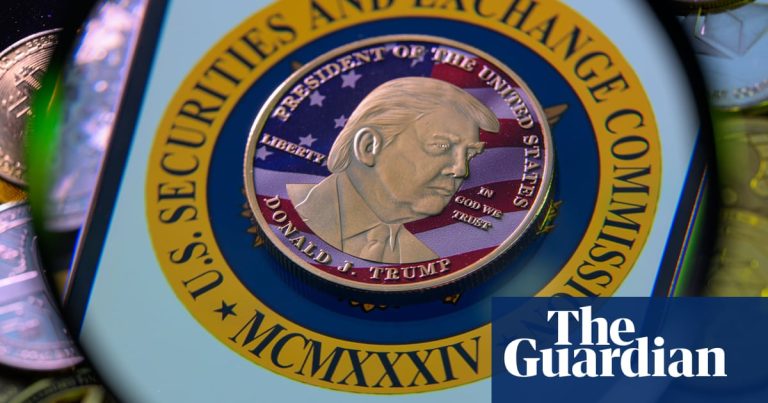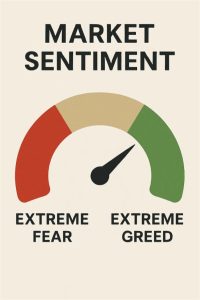The president is a brazen crook, but Democrats are too compromised to challenge him.
There’s never been an American politician as nakedly corrupt as Donald Trump, who makes even the most notorious crooks of history—a rogues’ gallery that includes William Marcy “Boss” Tweed, Warren G. Harding, and Richard Nixon—look like penny-ante con men. These villains only cashed in to the tune of thousands or millions of dollars, while Trump in his second term has entered the realm of billions.
But Trump’s corruption is more than a matter of the sheer scale of his chicanery or the amount of money in play. No prior crooked public servant has enjoyed such complete impunity from any serious consequences for utter lawlessness. The institutions that have a constitutional duty to keep a criminal president in check have repeatedly folded rather than hold Trump accountable, with the Supreme Court expanding the already generous latitude of presidential immunity to cover Trump’s transgression, and Congress repeatedly refusing to investigate the shady financial deals the Trump family has been engaging in as a sideline to his two terms in office. The majority of blame for this situation falls on the Republican Party, which has collectively decided that Trump is the political goose that keeps laying electoral gold so he must be defended at all costs. The near-total subservience of the GOP was evident in 2021 when, even after Trump incited a riot to attack the Capitol, only seven Republican senators voted to convict him after his second impeachment.
Trumpian corruption takes many forms—most recently using the threat of tariffs to strong-arm other countries into becoming customers of Elon Musk’s Starlink and the plan to accept a jumbo jet as a gift from the government of Qatar.
But Democrats have not been innocent of blame either in Trump’s repeated escapes from punishment. While Democrats have been more than willing to investigate and impeach Trump over national security matters (the Russiagate affair and Trump’s attempted quid pro quo deal with the Ukrainian president), as well as the attempted coup of 2021, the putative opposition party has been less willing to make an issue of Trump’s many fetid business practices, which have only gotten more brazenly venal as the president has learned how much he can get away with. Notably, there has been a reluctance to go after the Trump family for their business ties with Middle Eastern autocracies—perhaps because the oligarchs in Saudi Arabia and the United Arab Emirates are so deeply intertwined with the American political elite. It’s hard to escape the conclusion that one reason Trump goes largely unchallenged by both parties on financial corruption is that graft is too common in Washington to risk challenge.
The debate around regulating crypto currency illustrates both Trump’s corruption and the failure of Democrats to effectively counter it. On May 1, at a conference in Dubai, Zack Witkoff—who just happens to be the son of Trump’s envoy to the Middle East, Steve Witkoff, as well as the founder of the World Liberty Financial, the Trump family crypto firm—made a startling revelation. As The New York Times reported, Witkoff announced that “a so-called stablecoin developed by the firm would be used to complete the transaction between the state-backed Emirati investment firm MGX and Binance, the largest crypto exchange in the world.”
The Times went on to offer a detailed explanation of why this new business venture crossed ethical and legal lines:
Virtually every detail of Mr. Witkoff’s announcement, made during a conference panel with Mr. Trump’s second-eldest son, contained a conflict of interest.
MGX’s use of the World Liberty stablecoin, USD1, brings a Trump family company into business with a venture firm backed by a foreign government. The deal creates a formal link between World Liberty and Binance—a company that has been under U.S. government oversight since 2023, when it admitted to violating federal money-laundering laws.
And the splashy announcement served as an advertisement to crypto investors worldwide about the potential for forming a partnership with a company tied to President Trump, who is listed as World Liberty’s chief crypto advocate.
The problem with Trump’s crypto dealings can be described in broader terms as a conflict of interest: Crypto is an often shady industry that only survives by allowing for legally dubious financial transactions, and Trump as president oversees the government that regulates this industry. Trump is at the same time a crypto investor, a crypto regulator—and a politician whose campaign was heavily funded by crypto money.
Nor is Trump alone in having a conflict of interest in this area. As Jacob Silverman recently reported in a feature article for The Nation, “crypto, despite being a relative flop commercially, has infiltrated American politics.” “In the 2024 political campaign cycle,” Silverman observes, “crypto was the biggest donor by industry, raising more than $197 million.”
In the most recent cycle, most crypto money has gone to Republicans, who have found a natural affinity for an industry pushing for deregulation in the name of capitalist freedom. But crypto money has also gone to a significant sector of Democrats, mainly centrists based in New York such as Senator Kirsten Gillibrand and Representative Ritchie Torres, but also progressive Representative Ro Khanna, who represents Silicon Valley. Crypto kingpin Sam Bankman-Fried—prior to his being jailed for fraud in 2023—was the second-biggest donor to the Democratic Party in the 2020 election cycle, giving more than $40 million. But whether it’s been given to Republicans or Democrats, crypto money has always been deeply reactionary, pushing an agenda of deregulation and often aligning with a push to purge progressives from politics. It’s not an accident that crypto money, as Silverman notes, took credit for the defeat of stalwart progressives such as Senator Sherrod Brown and Representatives Jamaal Bowman and Katie Porter.
With Trump’s shameless crypto corruption now gaining headlines, Democrats remain torn on the issue of regulation. As Axios reports, Democratic lawmakers in Washington had a “tense” meeting on the topic last week: “Crypto divides Democrats on policy and politics. Some progressives, like Sen. Elizabeth Warren (D-Mass.), are concerned about fraud and corruption. Others, like Sen. Kirsten Gillibrand (D-N.Y.), are eager to provide firm guidelines and regulatory certainty for the industry.” What Axios doesn’t mention is that “firm guidelines and regulatory certainty” are crypto industry euphemisms for a friendly regulatory regime that legalizes many of risky legal practices that make investors wary.
The Democrats need to take a firm stance on crypto corruption. Unfortunately, Senate majority leader Chuck Schumer, who is himself in the pro-crypto camp and an eager recipient of crypto money, seems to have settled upon a solution that offers merely political theater rather than accountability. As David Dayen explained in The American Prospect, Schumer has tried to satisfy progressive criticism by pushing a bill that won’t pass, which will give cover to pro-crypto Democrats voting for an industry-friendly GENIUS Act written by Republicans:
This is a classic tactical move when Democrats want to pass something but know the optics are bad: come up with a different bill that will never pass so they can pretend they care. Sens. Chuck Schumer and Jeff Merkley introduced the End Crypto Corruption Act, which would ban the president, vice president, senior officials in the executive branch , members of Congress, and their immediate families from financially benefiting from crypto assets that they issue or endorse, including stablecoins. It’s a bill that is surely necessary in the current environment, but it will never get a passing vote from a Republican Senate, and it gives a safety valve to those Democrats who want to pass the GENIUS Act by saying that they support “ending crypto corruption.”
As my Nation colleague Zephyr Teachout sums up, “Democrats [are] actively backing extreme Trump corruption.” This is harsh, but accurate. The current crypto divide goes to the heart of the why the Democrats have been so ineffectual in fighting Trump and Trumpism: You can’t oppose the corrupting influence of Big Money if you yourself are deeply compromised. Democrats have a two-front battle: They need to clean their own house so they can also defeat Trump.










